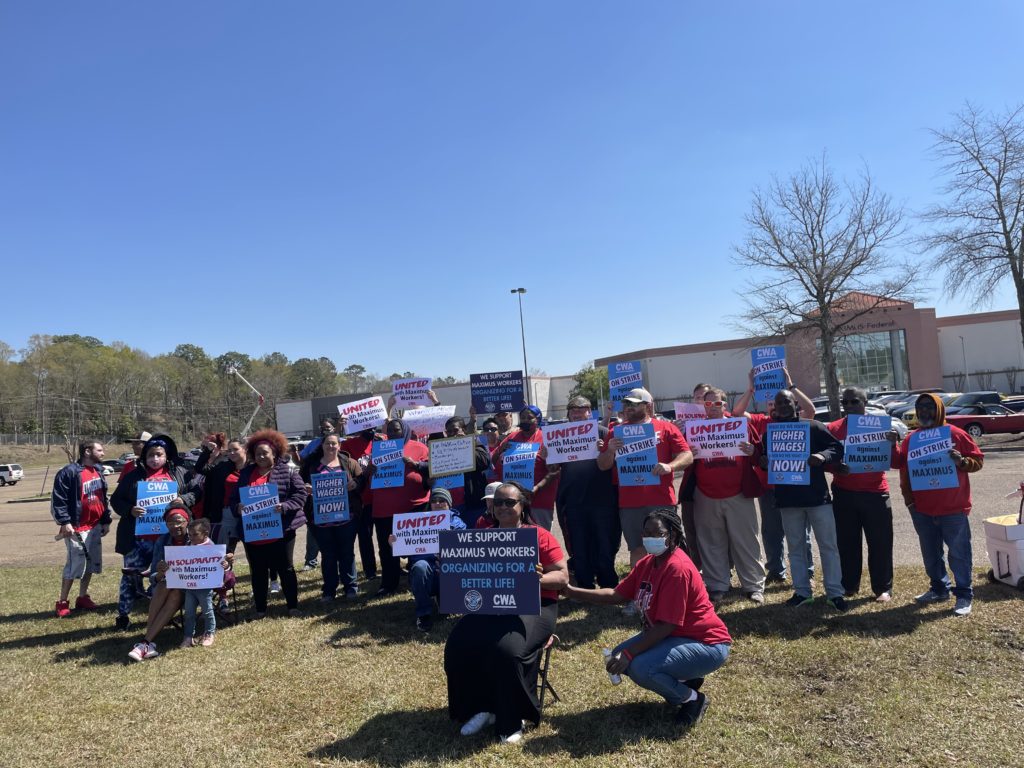On March 23, call center workers at the Maximus call center in Hattiesburg, Miss., launched a strike against unfair labor practices. They were joined by Maximus call center workers from Bogalusa, La. Despite fear of retaliation from their employer, in two so-called “right-to-work” states in the deep South with few employee protections, at least 30 call center workers refused to work and instead rallied for better working conditions and pay.
The workers have been organizing a union with the Communication Workers of America since 2017. Their employer Maximus is one of the largest federal contractors in the country. The majority of Maximus’s workforce in Hattiesburg are women and around half are parents. Even though Maximus does not officially recognize the workers’ union, they have been forced to give concessions due to pressure from the organizing efforts.
The strike was held at one of the largest federally-contracted healthcare providers in the country, and happened on the anniversary of the Affordable Care Act being signed into law. They were joined by workers from other industries including AT&T workers, who themselves went on strike in 2019 and are also with the CWA.
CWA organizer Sedgerick Lee said, “We are not alone — don’t ever feel you are by yourself. You have your community, your leaders fighting for you, we even got your babies fighting for you.”
What the call center workers are fighting for
According to the CWA support letter, workers want, “livable wages, paid sick leave for all, and the freedom to organize a union without interference!”
When the union started in 2017, Maximus told workers it would take an act of Congress to raise their pay from $9.05. But because of the union’s organizing and protesting, their pay has gone up to $9.64, then to $10.30, and then to $11. Now, due to a mandate granted by President Biden, as federal contractors they are expected to have a minimum pay of $15. Workers at these call centers are pointing out that this is not enough, since most call centers are paid at or above $15 an hour and some pay up to $45 an hour. Workers also have to deal with the rising cost of living across the country.

Christina Jimenez is a tier 1 representative at Maximus receiving $15 an hour. For her, it is not enough, as she said, “I am a single mother of three, so young children get sick, but I don’t get paid sick leave so I had to earn unapproved time and don’t get paid for that time. Whenever I get paid, I have to decide if it’s lights or food.”
Workers at the strike pointed out the high cost of healthcare. A call center worker employed by Maximus, Anna Flemmings, said she uses Maximus’s healthcare plan, which has a $4,500 deductible. She explained, “I had to have cataract surgery on the eyes, which my eyes were required to do my job and I had to deduct pay $5,000 based on the amount of money I received. I had to make sacrifices within my household as a single parent. … I have a son, I can’t afford to put him on my insurance because it would take half of my paycheck.” She added, “We are considered essential health care workers and we should be accommodated.”
Maximus’s CEO Bruce Caswell’s annual pay last year was more than $7 million, more than 208 times the pay of the average worker at his company.
Workers have stated that Maximus is waging an intense anti-union campaign. About this Jimenez said, “My personal experience is that if it’s good for [Maximus, they will] run with it. If its not good for them, they will try to fight it tooth and nail.”
Jimenez talked about breaking through the culture of fear in the South: “If you are afraid, I understand that. I actually was afraid to come out today as well. But just know you have people backing you up, whether you think not. Even if you are just one person you can make a change, you can do it at the end of the day.”
Workers have asked for everyone to support their struggle. To support the call center workers and find out more, visit here.





